Related Research Articles

Henk Badings was an Indonesian-Dutch composer.

Johan Theodorus Loevendie is a Dutch composer and clarinet player.

Johann Wilhelm Wilms was a Dutch-German composer, best known for setting the poem Wien Neêrlands Bloed to music, which served as the Dutch national anthem from 1817 to 1932.

Willem Frederik Johannes Pijper was a Dutch composer, music critic and music teacher. Pijper is considered to be among the most important Dutch composers of the first half of the 20th century.
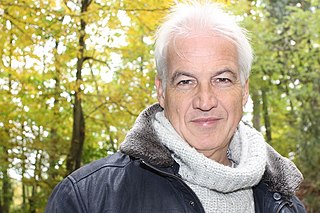
Michael Maria "Chiel" Meijering is a Dutch composer. He studied composition with Ton de Leeuw, percussion with Jan Labordus and Jan Pustjens, and piano at the Conservatorium van Amsterdam. He composed over 1000 works.
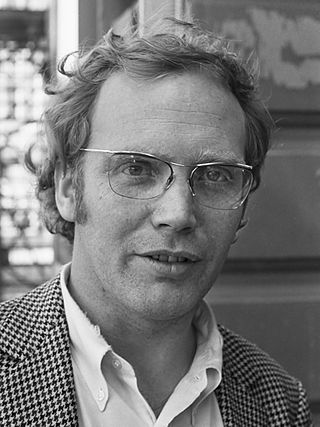
Peter Ane Schat was a Dutch composer.
Kees van Baaren was a Dutch composer and teacher.

Jan Pieter Hendrik van Gilse was a Dutch composer and conductor. Among his works are five symphonies and the Dutch-language opera Thijl.
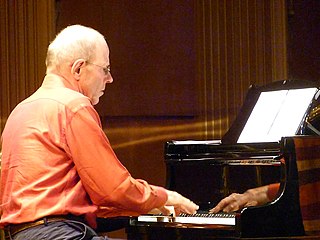
Guus Janssen is a Dutch composer of contemporary music and a recording artist. A pianist and harpsichordist, he is also active as a jazz performer.
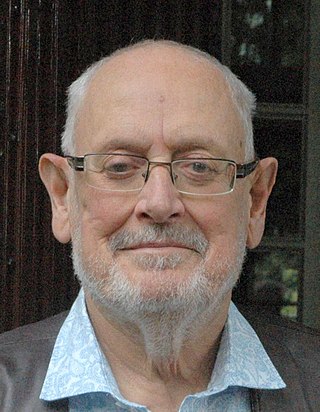
Rob du Bois was a Dutch composer, pianist, and jurist.
Eleonore Pameijer is a Dutch flute player.
Yannis Kyriakides is a composer of contemporary classical music, and sound art. His music explores new forms and hybrids of media, synthesizing disparate sound sources and highlighting the sensorial space of music. He has focused in the majority of his work on ways of combining traditional performance practices with digital media, particularly in the use of live electronics. The relation between music and language has been explored in many pieces that utilize text films as a multimedia element.

Theo Verbey was a Dutch composer. His style could be considered to be associated with Postmodern music. Verbey was also orchestrated Alban Berg's Piano Sonata, Op. 1 in 1984 while still a student.
August Louis Baeyens was a Belgian violist and composer.

Willem Jeths is a Dutch classical composer.
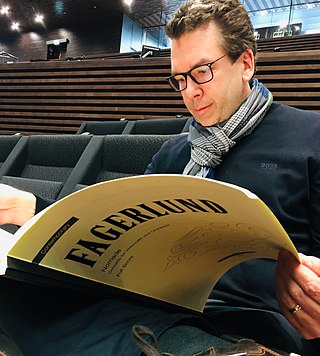
Sebastian Fagerlund is a Finnish composer. He is described as “a post-modern impressionist whose sound landscapes can be heard as ecstatic nature images which, however, are always inner images, landscapes of the mind”. Echoes of Western culture, Asian musical traditions, and heavy metal have all been detected in his music.
Orlanda Velez Isidro is a Portuguese classically trained coloratura soprano. Her preferred genre of music is Renaissance and Baroque repertoire. Since completing her education in Portugal and the Netherlands, she has lived and performed in the Netherlands.

Oscar van Hemel was a Dutch-Belgian violinist, music teacher and composer of contemporary classical music. His work includes two operas and symphonies.

Liza Ferschtman is a Dutch classical violinist who appears internationally, both as a soloist with orchestra and in chamber music. She received the Nederlandse Muziekprijs in 2006 and has directed the Delft Chamber Music Festival since 2007.
Clara Wildschut was a Dutch composer, pianist and violinist born in Deventer. She studied music at the Royal Conservatory of the Hague with Johan Wagenaar, E. van Beinum, André Spoor and F. Broer van Dijk. In 1930, she won a state scholarship for composition. She studied composition with Joseph Marx in Vienna and returned to Amsterdam in 1937.
References
- 1 2 Hi961 Music (Netherlands radio), Vanessa Lann, Retrieved Aug. 17, 2014, "...Vanessa Lann (born april 6, 1968 in Brooklyn, New York) is an American composer / Dutch composer, who currently lives in The Netherlands...In 1990 she received the John Knowles Paine Travelling Fellowship .."
- 1 2 Frits van der Waa, December 13, 2005, de Volkskrant , Chazan singing and tickling 'blue notes', Retrieved August 18, 2014, "...Composer / Dutch Composer Vanessa Lann, .. Lann was born in New York"
- 1 2 3 4 Contributions of Jewish Women to Music and Women to Jewish Music, Vanessa Lann Archived 2013-11-04 at the Wayback Machine , Retrieved August 17, 2014, "...American. Composer. b. Brooklyn, New York, April 6, 1968..."
- ↑ 1990, Harvard University Department of Music, Undergraduate Fellowships 1990–present Archived 2014-05-06 at the Wayback Machine , "...1990... Vanessa Lann received the John Knowles Paine Traveling Fellowship to study composition at the Koninklijk Conservatorium of The Hague..."
- ↑ Frits van der Waa − September 18, 2006, de Volkskrant , (in Dutch) Rondgang van orkest tot aan Paard van Troje, Retrieved August 18, 2014, "...Amerikaanse componiste Vanessa Lann ..."
- 1 2 A Compact Disc Recording of Four Contemporary Works for Clarinet by American, Mindy Marie Pyle, Proquest publishers (2008), Interview: Vanessa Lann, Retrieved August 17, 2014, See chapter 5 page 31
- ↑ January 23, 2014, Muziekgebouw (Netherlands), Sinfonia Rotterdam, Retrieved August 17, 2014, "...The American-Dutch composer Vanessa Lann writes a new bassoon concerto for the acclaimed bassoonist Bram van Sambeek and Sinfonia Rotterdam..."
- ↑ January 18, 2014, Fagotnetwerk, Discount Network members Bassoon bassoon concerto world premiere Vanessa Lann, Retrieved August 17, 2014, "..Dutch composer Vanessa Lann third Rotterdam Concerto for the renowned bassoonist Bram van Sambeek. That Vanessa Lann ... concerto for a less common solo instrument..."[ failed verification ]
- 1 2 Allan Kozinn, September 29, 2006, The New York Times, Playing With a Lot of Toys, but for a Serious Purpose, Retrieved August 17, 2014, "..Vanessa Lann’s Is a Bell ... a Bell? (2004) is a propulsively rhythmic score, but its real charm is its use of two toy pianos with different timbral qualities to suggest orchestration, of a sort. ..."
- ↑ Broadcast Live on ABC Classic FM, 30 April, Musica Viva Festival 2011, Retrieved August 17, 2014, "...Vanessa Lann Springs Eternal (2007).."
- ↑ Dordrecht February 18, 2013, Opera Magazine, "De Stilte van Saar in wereldpremière" (in Dutch), Retrieved August 17, 2014, ".. . En de opera zelf, die de Amerikaanse componiste Vanessa Lann schreef op een Nederlandstalig libretto van Erik-Ward Geerlings.." [the opera itself, which the American composer Vanessa Lann wrote on a Dutch libretto by Erik-Ward Geerlings]
- ↑ Kelly A. E. Mason, April 20, 1990, The Harvard Crimson , Forming Female Bonds, Performing the Bard, Retrieved August 17, 2014, "..The women cast as men in As You Like It also had a few problems with the Renaissance songs featured in the play, says musical director Vanessa Lann..."
- ↑ David Toub, Sequenza21, September 2006, Piano Music by Women Composers, Retrieved August 17, 2014, "...this album ... very nice compilation of expertly-performed music by a good selection of female composers. On this album, we find music by the well known (Meredith Monk, Sofia Gubaidulina) and the less well known (Vanessa Lann, ..)"
- ↑ Jed Distler (music reviewer), Classics Today, Don't Panic! 60 Seconds for Piano, Retrieved August 17, 2014, "....What are my favorite pieces? ... the gracious keyboard writing and humor of Vanessa Lann’s DD (Double D)..."
- 1 2 Frits van der Waa (music reviewer), February 25, 2013, de Volkskrant, "Review: The silence of saar", Retrieved August 17, 2014, ".. The Silence of Saar, a new half-hour opera by composer Vanessa Lann and libretto ... endless series of mind-numbing variations..."[ dead link ]
- ↑ Frits van der Waa, 14 December 2005, de Volkskrant, Chazan singing and tickling 'blue notes', Retrieved August 18, 2014, "...intense but sweet juicy tension..."
- ↑ Bela Luttmer, August 2, 2007, de Volkskrant, "You really want to deliver something beautiful", Retrieved August 18, 2014, "...Vanessa has a piece written especially for me ... She was immediately excited and started working..."
- ↑ July 28, 2014, Delft Post, Opening Delft Chamber Music Festival Archived 2014-08-19 at the Wayback Machine , Retrieved August 17, 2014, "...world premiere "Moonshadow Sunshadow" Vanessa Lann..."
- ↑ 2014, Radio 4 The Netherlands, , Retrieved August 17, 2014, "...The American-Dutch composer Vanessa Lann ... Lullabye for a young girl dreaming"
- ↑ September 18, 2011, Radio SRF 2 Kultur, "Konzert: Vanessa Lann, O Whispering Suns (UA)", Retrieved August 17, 2014, ".. Shared pain is not necessarily a problem halved, but one understands the pain of others better. The composer Vanessa Lann says about her piece O Whispering Suns, 'people singing together to hear each other.' ..."